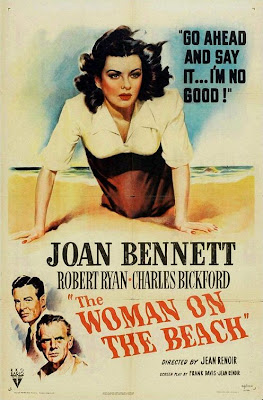Commerical artist Bob Randolph (Ronald Reagan) has been drawing the "ultimate woman." Dubbed "The Randolph Girl," she is perfect in every way, and publicity agent Chuck Donovan (Eddie Bracken) has been hired to learn the model's identity and track her down for a television appearance. Only problem is, as Chuck discovers upon his visit to Bob Randolph's office, there is no "Randolph Girl"...at least no single girl. Rather, she is a composite of twelve different women...eyes of one, nose of another, neck of another, ankles of another, etc. None of the girls know of the others' existence, though; each girl thinks she is the one and only "Randolph Girl."
Since there is no girl and, thus, no one to appear on the television show, Chuck feels life isn't worth living anymore, so he heads to Jones Beach, where he intends to drown himself. While out in a boat, he scans the shoreline with his binoculars, and to his amazement, he sees her---the spitting image of the Randolph Girl---all wrapped up in one perfect woman; quickly, Chuck lets Bob know that he has discovered the girl. The lovely beauty is Ruth Wilson (Virginia Mayo), a 6th grade teacher, who wants to be known and appreciated for her intellectual qualities rather than her looks.
With Miss Wilson's aversion to being sought out for her beauty, Bob knows she's not apt to jump at the chance to be his model; instead, he'll need to appeal to her intellectual side first...get to know her...then hopefully convince her to take up the "Randolph Girl" mantle. Since Ruth also teaches an adult education class for new citizens, Bob decides to pose as a new immigrant and enroll in her class. So, with a made-up name, an invented country, and an accent which changes by the minute, Bob makes the teacher's acquaintance as a student in her class. Of course, the two fall in love, but there are definitely complications---Bob isn't who Ruth thinks he is, the twelve models discover Bob's deception, and a snapshot is taken of a swimsuit-clad Ruth, getting her into hot water with the school board. How it all plays out is the balance of the film.
Originally, the female lead was to have gone to Lauren Bacall; however, she refused the part, and it went to Mayo. (Info found through a TCM article...HERE) While her reason for bowing out is not known, the TCM article makes clear that she and Reagan were political opposites and that she had refused other parts (Stallion Road and, later, Storm Warning) which would have required working with him. Quite honestly, if political differences were the reason she opted out of the role, I think it's a cop-out. After all, isn't giving the appearance of getting along with someone you don't like what acting is all about? Besides that, being on a different political page doesn't mean you can't get on with a person; in fact, my beloved Robert Ryan was about as politically different from me as one can be (as was John Garfield, whom I also quite adore). People don't have to think the same way I do for me to like them (or count them as a beloved!!) or work with them, so if political differences were Miss Bacall's reason for declining this film, I find that rather sad. Whatever her reason, the role went to Miss Mayo, who, I think, was totally perfect in it. She's beautiful and perky and loads of fun, and her chemistry with Mr. Reagan was great. (I know they worked together in another film as well...She's Working Her Way Through College.) Oh, and just FYI, my beloved William Holden thought differently about Mr. Reagan---they were good friends, and he was the best man at his wedding to Nancy.
The film has a very cute little theme song.
The courtroom scene is quite comical; especially funny is Henry Travers, who portrays the judge. Though he wants to run a tight ship and keep everyone in line, the sight of the lovely Ruth in a swimsuit just can't help but have an effect on him.
The Girl from Jones Beach is definitely a cute, loads-of-fun film. Yes, it's predictable, but getting to that predictable ending is totally delightful. I definitely recommend this film; however, it may be a difficult one to track down. It is not out on DVD, nor can I find it on YouTube. It is not currently on the TCM schedule; they do show it fairly regularly, however, so hopefully you can catch it in the next few months.
Happy viewing!!!






















_01.jpg)



_10.jpg)


























